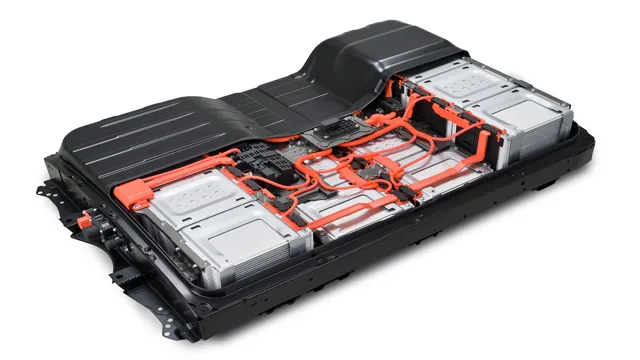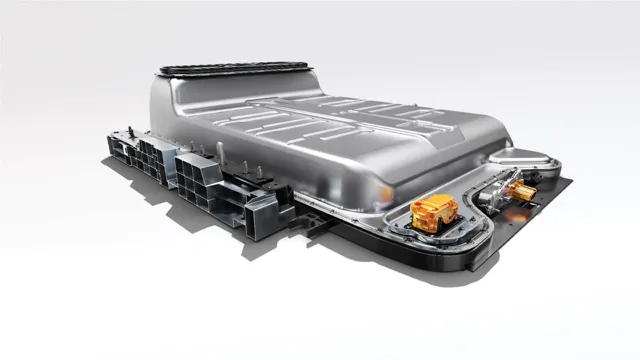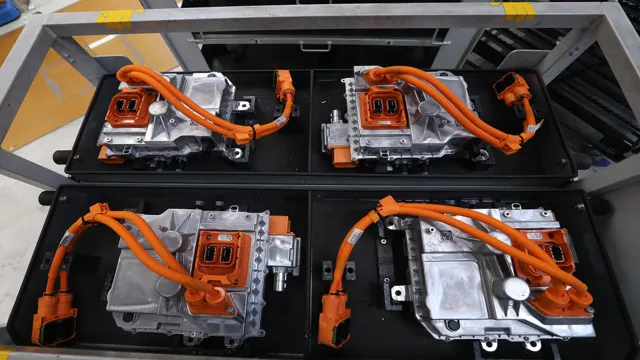Demystifying the Battery Electric Car: A Comprehensive Definition
Battery electric cars have been making a lot of headlines in recent years, as more and more people become aware of the benefits of electric vehicles. With concerns about the environment, rising fuel costs, and long-term sustainability becoming more pressing, it’s no wonder that battery electric cars are rising in popularity. But what exactly are battery electric cars, and how do they work? In this blog, we’ll explore the ins and outs of battery electric cars, looking at everything from the technology behind them to the many benefits they offer.
Whether you’re a seasoned electric car enthusiast or just getting started, this blog is for you!
Definition
A battery electric car is a type of vehicle that runs solely on electricity supplied by a rechargeable battery. Unlike gasoline-powered cars, battery electric cars produce zero emissions and are considered environmentally friendly. They have an electric motor that runs on energy from the battery, eliminating the need for a fuel tank or gas-powered engine.
Battery electric cars are also very efficient, as they convert more energy into actual motion than traditional gasoline-powered cars. However, they do require charging, which can be done at home or at a public charging station. Overall, a battery electric car is a great option for those looking for a sustainable and efficient mode of transportation.
A car that runs solely on an electric battery.
An electric car, also known as an EV or electric vehicle, is a type of car that runs on an electric battery rather than gasoline. EVs are powered entirely by an electric motor and use electricity stored in batteries to run. These cars produce zero emissions at the tailpipe, making them an eco-friendly option for drivers.
Unlike traditional cars, electric cars require charging instead of refueling, which is done by plugging the car into a charging station or a wall outlet. EVs can have a range of up to 500 miles on a single charge depending on the battery size, making them a practical choice for everyday driving. Switching to an electric car can offer numerous benefits, including reduced air pollution, lower energy costs, and decreased dependence on foreign energy sources.
With the advancement in technology, EVs are becoming more accessible and affordable for consumers. Choosing an electric car is a great way to embrace sustainability and help protect the environment for future generations.

Advantages
A battery electric car definition refers to a type of vehicle that is powered by an electric motor and draws energy from rechargeable batteries. This innovation has countless advantages, making it an alluring prospect for those who are seeking an eco-friendly and cost-efficient transportation alternative. For starters, a battery electric car is significantly cheaper to operate than a traditional gasoline-fueled car.
Owners can power their vehicles by simply plugging them into an electrical outlet at home, workplaces, or public charging stations, thus avoiding the costly gas refills and maintenance expenses associated with conventional cars. Additionally, battery electric cars produce zero-emissions directly, thus positively impacting the environment, reducing pollution, and mitigating climate change. This makes them an excellent option for individuals who want to make a positive impact on the world while also saving money.
Finally, Electric cars are silent, smooth and provide a unique driving experience that cannot be found in gas-powered cars. The feeling is akin to driving a spaceship or gliding on air.
Zero emissions, low operating costs, smooth driving experience.
Zero-emission cars have a lot of advantages over traditional gas-powered vehicles. Not only do they help to reduce carbon emissions, but they also have low operating costs and provide a smooth driving experience. With zero emissions, it means that they don’t produce harmful pollutants like carbon monoxide and nitrogen oxide that can deteriorate air quality, thereby promoting healthier living.
Furthermore, electric cars have reduced operating costs due to fewer moving parts that require maintenance. Owners can save a lot on fuel expenses and even access rebates or tax credits from local governments to incentivize the purchase and use of green vehicles. Finally, electric cars offer a quieter driving experience, with smooth acceleration and quieter engines that enhance the overall driving experience.
All in all, if you’re looking for an eco-friendly vehicle that can help you save money and provide a satisfying driving experience, a zero-emission electric car is the way to go.
Disadvantages
When it comes to the definition of a battery electric car, there are both advantages and disadvantages to keep in mind. On the downside, one of the most significant challenges is the limited driving range. Typically, a battery electric car cannot travel as far as a gasoline-powered vehicle before needing a charge.
This can be a concern for drivers who frequently take long road trips and do not have access to charging stations along their route. Additionally, charging an electric car can take much longer than filling up at a gas station. While advances in technology have led to faster charging times, it still requires more patience and planning than refueling with gasoline.
Battery electric cars also tend to be more expensive upfront, although they may offer long-term savings on fuel and maintenance costs. Overall, while battery electric cars may not be the right choice for everyone, they offer a promising alternative to traditional gasoline-powered vehicles, and advancements are constantly being made to address their disadvantages.
Limited driving range, longer charging times, higher initial cost.
Electric vehicles have become increasingly popular in recent years, but they still come with some disadvantages. One of the main drawbacks is the limited driving range, as the current battery technology only allows for a certain distance before needing a recharge. This can be problematic for those who frequently travel long distances or live in areas with limited charging infrastructure.
Additionally, the charging time for electric vehicles is generally longer than refueling a gas-powered car, which can be inconvenient for those with busy schedules. Moreover, the initial cost of purchasing an electric vehicle can be higher than traditional cars. However, it’s important to note that electric vehicles have lower maintenance and operating costs over time, which can offset the initial investment.
Overall, while electric vehicles have their limitations, they also have numerous benefits that can make them a worthwhile investment for environmentally-conscious individuals.
Examples
If you’re looking for a battery electric car definition, you’ve come to the right place. Simply put, a battery electric car is a fully electric vehicle that runs on battery power alone. Unlike hybrid cars, which rely on both gasoline and electric power, battery electric cars don’t have an internal combustion engine.
Instead, they use an electric motor powered by rechargeable batteries to move. Notable examples of battery electric cars include the Tesla Model 3, the Nissan Leaf, and the Chevrolet Bolt. These cars offer zero-emissions driving and are becoming increasingly popular as more charging infrastructure is built.
With a battery electric car’s range increasing from 50-75 miles per charge in early models to around 300 miles per charge on newer versions, it’s no wonder more and more people are making the switch to electric.
Tesla Model S, Nissan Leaf, Chevrolet Bolt.
Electric cars have become increasingly popular over the years, and there are many great options on the market. Three examples of electric cars that are worth considering are the Tesla Model S, Nissan Leaf, and Chevrolet Bolt. The Tesla Model S is a luxury electric car that is well-known for its impressive range and performance.
It has an all-electric driving range of up to 402 miles and can accelerate from 0 to 60 mph in as little as 4 seconds. The Nissan Leaf, on the other hand, is a more affordable option that has been around for over a decade.
It has a range of up to 149 miles and is a great choice for those who are looking for a reliable electric car that won’t break the bank. Finally, the Chevrolet Bolt is a versatile electric car that has a range of up to 259 miles. It has plenty of cargo space and is a great option for those who need a car that can handle their daily tasks while still being environmentally friendly.
No matter which electric car you choose, you can feel good knowing that you are doing your part to reduce your carbon footprint and make the world a better place for future generations.
Future Outlook
When it comes to defining a battery electric car, the future outlook is certainly exciting. Essentially, a battery electric car is a vehicle that runs solely on an electric motor powered by rechargeable batteries, rather than relying on gasoline or diesel fuel. With more and more focus being placed on reducing emissions and combating climate change, battery electric cars are increasingly becoming a popular choice for environmentally-conscious drivers.
The good news is, battery technology is advancing at an impressive rate, meaning that the range and efficiency of electric cars is improving all the time. In the future, we can expect to see even more affordable, reliable, and practical battery electric cars on our roads, making sustainable transport a realistic choice for everyone. Whether you’re a city commuter or a long-distance driver, it’s clear that battery electric cars have the potential to revolutionize the way we travel.
Expected to become increasingly popular as battery technology improves.
The future outlook for battery technology is quite promising, and it’s expected that this technology will become increasingly popular as battery technology continues to improve. With the increasing demand for cleaner and more sustainable energy sources, batteries are poised to play a significant role in powering various devices and machines. One significant factor driving the growth of this technology is the need to reduce carbon emissions, as batteries help to provide a cleaner alternative to traditional fossil fuels.
Another significant driver is the increasing demand for renewable energy sources, such as solar and wind power, which require storage solutions with the capacity to hold large amounts of energy over extended periods. As technology continues to improve, batteries will be able to store more energy in smaller, lighter packages, making them more cost-effective and convenient for consumers. In addition, new battery chemistries are being developed, which will help to improve the lifespan and overall performance of these devices.
One promising development is the rise of solid-state batteries, which have the potential to increase energy density, safety, and longevity. As the demand for batteries grows, we may see an increase in battery recycling programs to help reduce waste and recover valuable materials. Additionally, battery technology may be utilized in new applications, such as electric vehicles and energy storage for homes and businesses.
With these promising developments on the horizon, the future of battery technology looks bright, and it’s likely that we’ll see this technology become more prevalent in our daily lives in the years to come.
Conclusion
In conclusion, a battery electric car is not just a mode of transportation, it’s a statement about our commitment towards a sustainable future. It’s the embodiment of our desire to reduce our carbon footprint and pave the way for cleaner and greener mobility. It’s the ultimate fusion of technology and innovation, empowering us to redefine the limits of what is possible.
So, if you want to join the electric revolution and leave behind the gas-guzzling past, hop in to a battery electric car and take the road less traveled, the road towards a better tomorrow.”
FAQs
What is a battery electric car?
A battery electric car is a type of electric vehicle (EV) that runs completely on electricity stored in rechargeable batteries.
How does a battery electric car work?
A battery electric car uses an electric motor powered by a rechargeable battery pack to propel the vehicle. The battery pack is charged by plugging it into an external power source, such as a charging station or a wall outlet.
What are the advantages of a battery electric car?
Battery electric cars have several advantages over traditional gasoline-powered cars, including lower operating costs, zero emissions, quiet operation, and a smoother driving experience.
What is the range of a battery electric car?
The range of a battery electric car varies depending on the model and the size of the battery pack, with some models offering ranges of over 300 miles per charge. However, range anxiety is still a concern for some drivers, as the infrastructure for charging stations is not as robust as gas stations.



